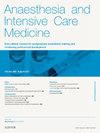Ethics of pregnancy testing in patients undergoing anaesthesia and surgery
IF 0.2
Q4 ANESTHESIOLOGY
引用次数: 0
Abstract
A patient's pregnancy status should be determined prior to undergoing any procedure which has the potential to cause harm to a pregnant mother or fetus. Anaesthesia and surgery, alongside the associated physiological stress and radiation exposure, pose some increased risks to the pregnancy and developing fetus. The fetus is most vulnerable in the first trimester, when the mother is more likely to be unaware of the pregnancy. National guidance suggests all women of child-bearing potential should be offered a pregnancy test prior to surgery if pregnancy status is uncertain. The results of this test can be used to inform decision-making regarding anaesthetic and surgical techniques, and in relation to timing of surgery. Whilst the testing is done in part to protect the unborn child, the fetus in of itself has no legal personality or rights until birth, and ultimately the decision to consent to surgery is that of the patient. Elective procedures can be postponed to minimize the risk to the pregnancy of miscarriage or teratogenicity. Most patients will be able to consent to pregnancy testing and the procedure. Potential ethical issues arise if the patient lacks capacity or is under the age of 16.
求助全文
约1分钟内获得全文
求助全文
来源期刊

Anaesthesia and Intensive Care Medicine
ANESTHESIOLOGY-
CiteScore
0.50
自引率
0.00%
发文量
152
期刊介绍:
Anaesthesia and Intensive Care Medicine, an invaluable source of up-to-date information, with the curriculum of both the Primary and Final FRCA examinations covered over a three-year cycle. Published monthly this ever-updating text book will be an invaluable source for both trainee and experienced anaesthetists. The enthusiastic editorial board, under the guidance of two eminent and experienced series editors, ensures Anaesthesia and Intensive Care Medicine covers all the key topics in a comprehensive and authoritative manner. Articles now include learning objectives and eash issue features MCQs, facilitating self-directed learning and enabling readers at all levels to test their knowledge. Each issue is divided between basic scientific and clinical sections. The basic science articles include anatomy, physiology, pharmacology, physics and clinical measurement, while the clinical sections cover anaesthetic agents and techniques, assessment and perioperative management. Further sections cover audit, trials, statistics, ethical and legal medicine, and the management of acute and chronic pain.
 求助内容:
求助内容: 应助结果提醒方式:
应助结果提醒方式:


